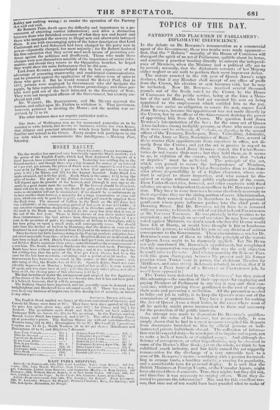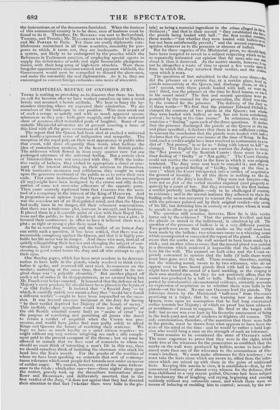TOPICS OF TIIE DAY.
PATRIOTS AND PLACEMEN IN PARLIAMENT: DIPLOMATIC INEFFICIENCY.
IN the debate on Dr. BOWRING'S remuneration as a commercial agent of the Government, these two truths were made apparent— first, that the " Reform " majority of the house of Commons will disregard the spirit of an act of Parlitunent, quibble about its letter, and sanction a practiee•tending directly to subvert the' independ- ence of Members, when the Ministry and a political ally are to be served; secondly, that the diplomatic servants of her Majesty either neglect or are unfit to pertbrm their most important duties. 'lime statute enacted in the Gth year of Queen ANNE'S reign declares, that if any Member shall accept of any office of profit from the Crown, his election or seat becomes void, but he may be reileeted. Now Dr. Ilownix,-: received several thousand pounds out of the funds voted to the Crown by the House of Commons for the public service, being at the time a Mem- ber of the said House, who had nod vacated his seat on being appointed to the employment which entitled him to the pay. And he was under no obligation to vacate his seat, argues Lord JOHN RUSSELL, because his appointment WilS lint Made direelly by the Crown, but by an officer of the Government deriving the power of' appointing him from the Crown. We question Lord Joim Russimes interpetration of the law ; for the same act of Queen ANNE includes among ineligible persons, or those who must vacate th;:ir scats and be reelected, all " e/erks, dPintlit a, in the several offices of the Treasury, Exchequer, Navy, Victualling, Admiralty, Pay of the Army or Navy, Secretaries of State." Now, several of these receive their appointments from superiors in office, not di- rectly from the Crown ; and yet the act is precise in regard to them. True, as Lord Jou N RUSSELL rtnt Cd, the Under- &ere.. t:tries do not vacate their seats ; but they hold them, as it seems to us, in violation of the statute, which declares that "clerks or deputies " must be rei,leeted. The I/rind/de of the act, which was passed to secure the independence of Members, applies with greater force to Under-Secretaries than to function- aries whose responsibility is of a higher character, whose con- duct is suhject to closer inspection, and who cannot be dis- missed or resign without some public explanation of the cause. Even Under-Secretnries, however, and ober employi.s with fixed salnrics, are more independent than an officer in Dr. BOW RING'S posi- tion. They have in Si Mlle bevome absolutely necessary to their superiors: they are the sitting portion of every Administration, because their removal would be hazardous to thi inexperienced gentlemen whom party influence pushes into the chief posts of Downing Street. But Dr. llownim: might have been removed. without warning to himself, or risk of miy hind to Lord PAIN ElISTON or Mr. Pori,ETT Tito:Th=0N. Ile seas precisely in the positioa to be dependent ; and though on several occasions he may have actually voted ag,ainst Ministers, we doubt much whether the Doctor would have felt at liberty, or would have thought it ihir or handsome towards his patrons, to withhold his vote on ;my division of serious consequence to the Government. These circurnstancus render Dr. Bowat so's case one of those to which the principle of the statute of Queen ANNE ought to be rigorously applied. Yet Mr. Ilumn not only sanctioned Dr. noweiNG'S a 1) pOi 11 tilt :IA, but complained that his remuneration was niggardly : that was the only objection he could raise to tile vote. And when taunted by Sir llomnimer PEEL with this gross discrepancy between his present and his former practice when Tories mere in power, the ci-devant 'Member for Aliddlesex, and once sturdy Ilefornmer, retorted, in that if it had been a Peer. instend of a llt.ssELL or PA Lmmtsrox job, he reouW have opposed it !
The Tories were defeated by the " Reformers ;" but they gained this advantage—the sanction cmf their opponents for employi»g and paying Members of Parliament in any way it may suit their con- venience, without putting those gentlemen to the cost of vacating their seats and procuring a reilection. All the precaution needed to bribe nnd job in safbty, is to keep the Queen's name out of the commissions of appointment. They have a precedent for making the Act of (been ANNE 11. dead letter, in the cases where most of all its activity might prove inconvenient to them and necessary for the protection of' time public interests.
An attempt was made to depreciate Dr. llowneso's qualifica- Hops, and the value of his labours; but umaiecessfully. It was simply shown that he had in a great measure coulilled his Reports from documents furnished to hitt) by m ■fficial rwrsons or well- instructed private individuals abroad. The collection of informa- tion was his especial duty—he was deputed to inquire and report, not to write a book of travels or of original essays. And although de- ficiency of arrangement, or other imperfection.,, may be ohs,:rved in sonic of the Doctor's Blue llook3, yet on the whole, we think he has exhibited much industry, and has fairly earned the not niggardly remuneration for the discharge of' a very agreeable task to a man of Dr. llownixo's tastes—combining with a passion for travel- ling in strange lands, a bustling activity, a craving for popularity, and a considerable turn for personal display. It is said that the British Ministers at Foreign Courts, or the Consular Agents, might have obtained these documents. True, they might ; but they did not, and therefore it was necessary to employ others. Were they di- rected to procure the information? No; and for this excellent rea- son, that nine out of ten would have been puzzled what to make of the instructions, or of the documents furnished. When the business of this commercial country is to be done, men of business must be found to do it. Therefore, Dr. BOWRING was sent to Switzerland, Tuscany, and Prussia ; Mr. Mscounoou was despatched to Naples; and Mr. PORTER to Paris. Yet there are costly diplomatic esta- blishments maintained in all those countries, ostensibly for pur- poses to which, it turns out, they arc inadequate. It is part of a system, not likely to be endangered by the practice which the Refbriners in Parliament sanction, of employing special agents to supply the deficiencies of noble and right honourable plenipoten- tiaries, with their long array of high-born attaches. Were these irregular appointments discountenanced and payment withheld, the Government would soon be compelled to discard the show-men, and make the ostensible the real diplomatists. As it is, they are encouraged to convert foreign embassies into nests of sinecures.



























 Previous page
Previous page